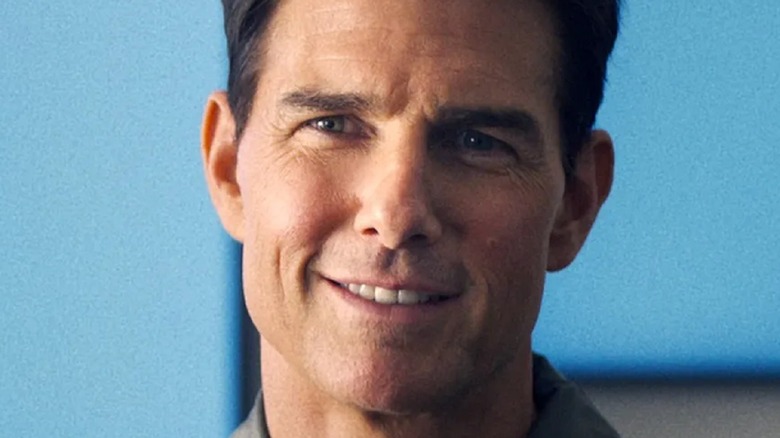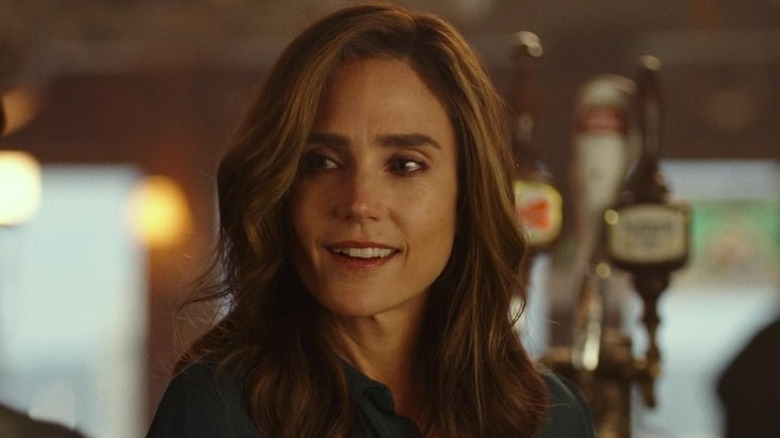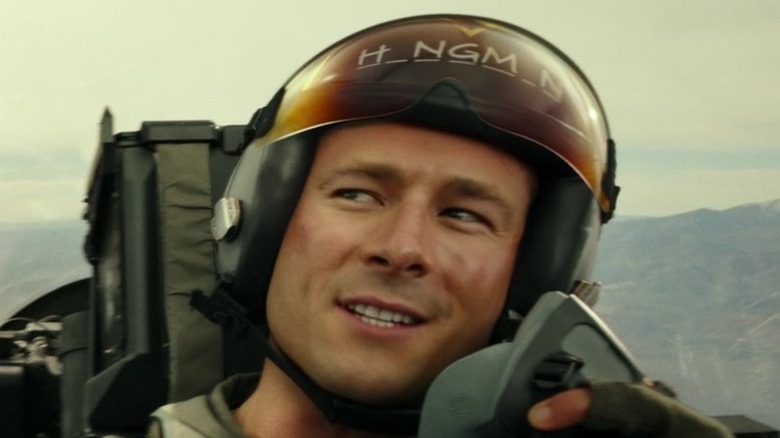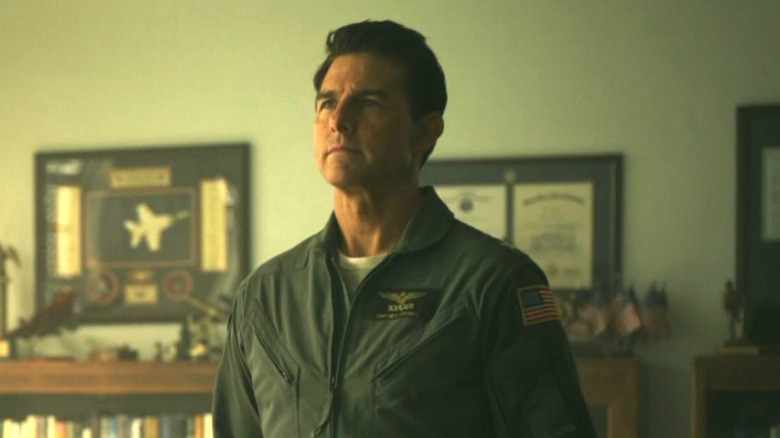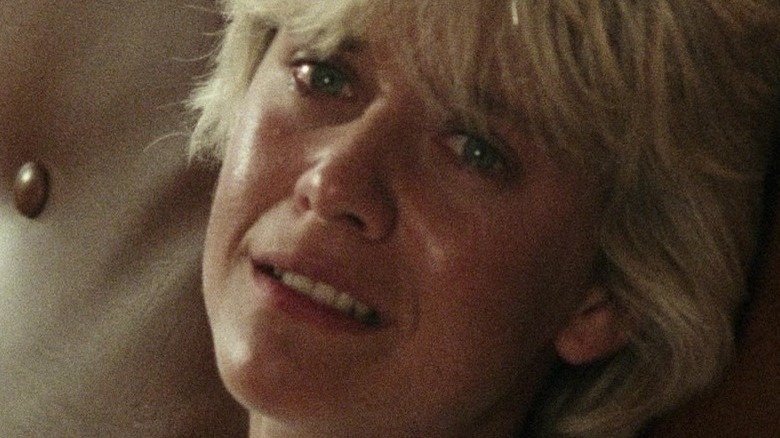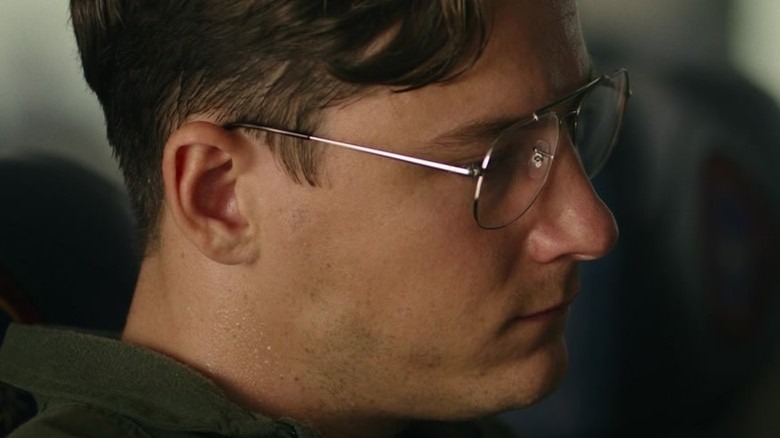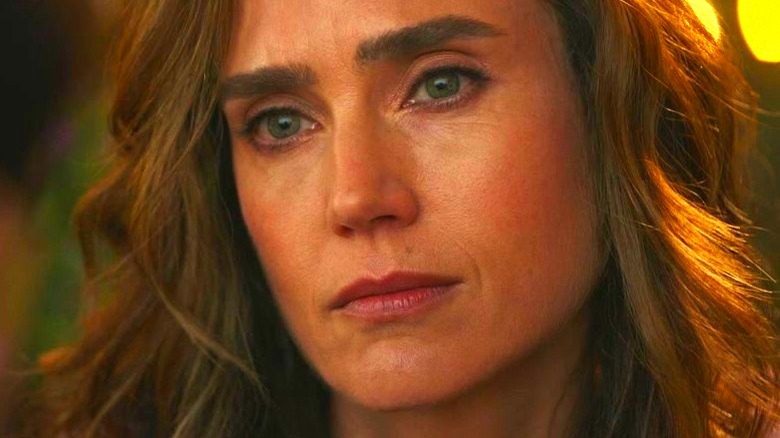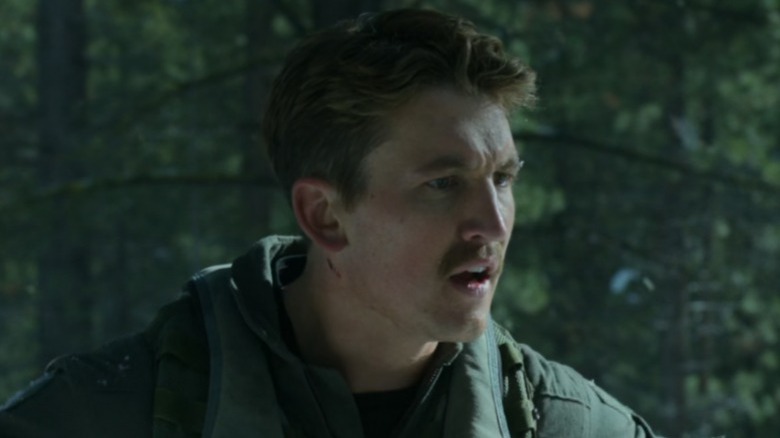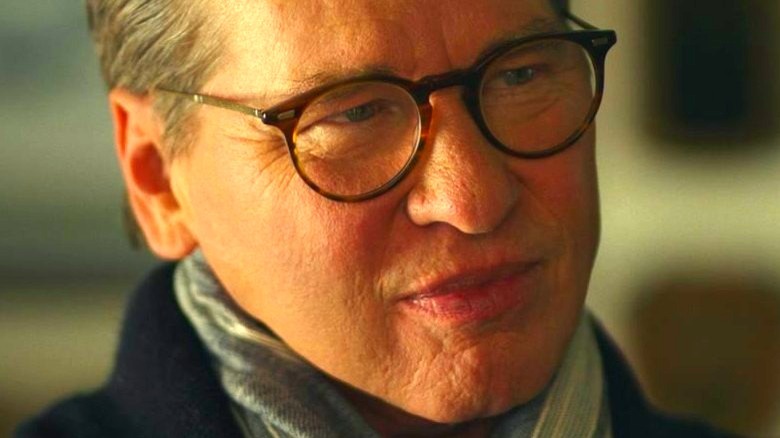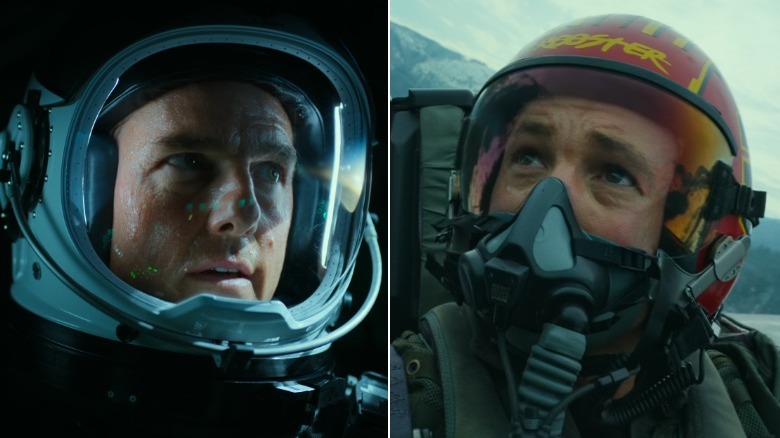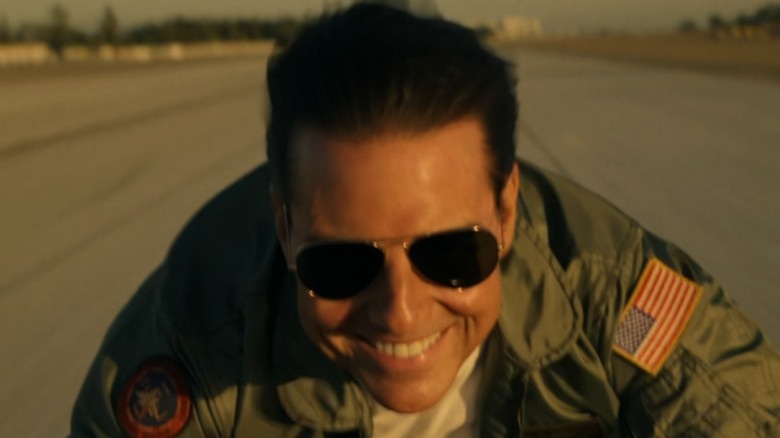Lines In Top Gun: Maverick That Are More Important Than You Realized
Few legacy sequels can boast having outperformed their predecessor both critically and commercially as 2022's "Top Gun: Maverick," the much-awaited follow-up to the 1986 hit "Top Gun," which had not only launched its leads Tom Cruise and Val Kilmer to stardom but is also remembered as a movie that defined the generation of the 1980s. "Top Gun: Maverick" takes place some 30 years after the original film, and follows Pete "Maverick" Mitchell (Cruise) as he is called back to his alma mater to train new recruits for a dangerous mission. One of those recruits is Bradley "Rooster" Bradshaw (Miles Teller), the son of Maverick's late friend and wingman Nick "Goose" Bradshaw.
Not everyone was confident about the film before its release. Some were skeptical about the time it took to get the film made, its relevance in a superhero-dominated market, and the apparent dwindling star power of Cruise. Alas, the film scored a near-perfect 96% on Rotten Tomatoes and grossed over $1.4 billion worldwide at the box office (via Box Office Mojo), making it the highest-grossing film of 2022 before being beaten by "Avatar: The Way of Water" (via Collider). Against all odds, a case can be made "Top Gun: Maverick" is better than the original movie. The film received plaudits not just for its spectacular aerial sequences, but also for its emotional weight, thematic resonance, and memorable dialogue. And so, here are some of the lines in "Top Gun: Maverick" that are more important than you realized.
Another admiral
Fans were disappointed to find that Kelly McGillis wasn't returning as Charlotte "Charlie" Blackwood, Top Gun instructor and Maverick's love interest from the first film, in the 2022 sequel. However, the film introduces a seemingly new character as a romantic foil to Maverick: Penny Benjamin, a single mother and bar owner with whom Maverick had a tryst or two in the past. However, the character isn't as new as you'd think, as two separate fleeting mentions in both "Top Gun" films suggest that Jennifer Connelly's Penny has actually been a part of Maverick's life longer than Charlie.
When Penny and Maverick meet at her bar for the first time in many years, Penny asks who Maverick "pissed off" this time to send him to North Island. "Another admiral," Maverick answers, to which Penny responds, "Exactly." For any first-time viewer, the line may seem like a throwaway reference between the two characters, but eagle-eyed (and eagle-eared) fans would recall that in the first film, Penny was mentioned by name to be the daughter of an admiral whom Maverick had angered by dating his daughter. This adds a whole new context to this dialogue, as well as more depth and backstory to Maverick and Penny's relationship. Given that Maverick had name-dropped Penny before he even met Charlie, it proves that his relationship with Penny predated the one Maverick shared with Charlie.
That's why we call him Hangman, he'll always hang you out to dry
When audiences are introduced to Lieutenant Jake "Hangman" Seresin (Glen Powell), he rubs the rest of the Top Gun recruits the wrong way, particularly Rooster. His arrogance about his talent makes him a spitting image of who Maverick was before Goose's death, along with being a competitive foil to Rooster in the same way that Iceman was to Maverick in the first film.
During their orientation test flight at Top Gun, where Maverick challenges the students to a dogfight, Hangman gets cocky about his lone ability to beat his mentor (who holds a 30-year-long reputation for being one of the best pilots in the Navy) without the help of his teammates. As he pursues Maverick alone, he leaves his wingman Phoenix (Monica Barbaro) and Bob (Lewis Pullman) to fend for themselves, which prompts Phoenix to explain why they call him the "Hangman" — he'll "always hang you out to dry."
Thankfully, Hangman doesn't have to experience a painful loss in the field to learn his lesson. After Maverick proves that the mission can indeed be accomplished within the tight timeframe, Hangman is more receptive to learning from Maverick's advice, notably the importance of putting your ego aside for your wingman. Despite expecting to be picked himself, he accepts Rooster's selection as Maverick's wingman for the final mission. He even saves the pair's lives in the mission's closing minutes without being overly smug about it, no longer "hanging [them] out to dry."
And how to come home, sir
When Vice Admiral Beau "Cyclone" Simpson (Jon Hamm) reprimands Maverick for going below the hard deck (5,000 feet above ground level) on his first day teaching the Top Gun class, Maverick reasons that given the low-altitude nature of their mission, it's necessary for him to train his students accordingly. Cyclone reminds Maverick that his mission is to teach the students how to fight as a team and to strike the target when Maverick adds "and how to come home." Cyclone remains silent as Maverick emphasizes his point by repeating himself.
Maverick's response demonstrates his priority of ensuring that every man and woman on the mission survives, even if it means risking or sacrificing his own life, as he does for Rooster at the film's climax by taking a missile for him. His insistence on having a tight two-minute, 30-second limit to complete the mission (which would grant time for the recruits to escape) puts him at odds with Cyclone, who pushes for a lax four-minute limit, even if it makes the post-mission escape harder. This is clearly an effect of Goose's death that compels Maverick to go over and beyond for his comrades, even disobeying direct orders from a superior. When Commander Solomon "Warlock" Bates (Charles Parnell) reminds Maverick that every mission has its risks and that the pilots accept those risks, Maverick stands his ground by firmly stating, "I don't, sir."
His mother never wanted him to fly
Along with Maverick's love interest Charlie from "Top Gun," another key character from the original 1986 film was absent in its 2022 sequel: Goose's beloved wife Carole Bradshaw, played by Meg Ryan. Maverick shared a close friendship with Carole, who was delighted that Maverick and Charlie had gotten together as the four shared a memorable double date that culminated in the "Great Balls of Fire" singalong. After Goose's death, Carole told Maverick how much Goose loved to fly with him, as she comforted him with a hug. Notably, she never blamed him for her husband's death, knowing that the incident left Maverick deeply scarred.
Even though Maverick seemingly overcame his guilt for Goose's death by throwing his dog tags overboard at the end of the first film, he's still haunted by the incident 36 years later. It has affected Maverick's relationship with Goose's son, Rooster, who holds a grudge against Maverick not for his father's death, but for rejecting his application to the Naval Academy. While we see Maverick grappling with his guilt throughout the film, we're left to wonder where Carole is amidst all this, until Maverick reveals to Penny why he pulled Rooster's papers from the academy, and what happened to Carole. Carole didn't want her son to share the same fate as her husband and before her death, she made Maverick promise her he wouldn't let Rooster fly. This dialogue unveils the misunderstanding between Maverick and Rooster, whose surrogate father-son relationship is the thematic core of "Top Gun: Maverick."
Don't tell me, tell it to his family
During the training for the low-altitude mission, the Top Gun trainees encounter a variety of challenges in not just maintaining the low altitude or meeting the strict time constraints, but mostly in coordinating with their fellow pilots and being on a level playing field. Maverick chides his students for not following protocol and endangering the lives of their team members during training. He stresses the fact that, if anyone allowed their teammate or wingman to die in the field, the most difficult thing the soldiers would have to do is answer for it, not to Maverick or the board of inquiry, but to the grieving families of their fallen teammates.
Along with being a character-defining moment for Maverick and his guilt for Goose's death that has been persisting for over 30 years, his emphasis on having to answer to one's family members harkens back to the sad moment in the first film when Maverick had to hand Goose's possessions to his wife Carole. Even though neither Carole nor the board of inquiry held Maverick responsible for Goose's death, facing the now-widowed Carole and fatherless Bradley remains to be enough of a painful and difficult memory for Maverick to ensure that none of his students would ever have to face that situation.
You'll have to find a way back on your own
In the 36 years since "Top Gun," Maverick's friend Tom "Iceman" Kazansky climbed the ranks to become an admiral and commander, while Maverick remained a Navy test pilot, despite the fact that, as Admiral Cain (Ed Harris) remarks, Maverick should already be a two-star admiral, if not a senator. Although Maverick claims his love of flying was the driving force behind it, this deliberate stagnancy can also be a symptom of Maverick's inability to let go of the past. Maverick had been counting on Iceman despite the U.S. Navy's "Up or Out" policy, not only to retain his position but also to prevent him from losing it due to his daring exploits and insubordination.
Cyclone swiftly removes Maverick from the Top Gun mission training after Iceman dies, putting the always self-assured Maverick at a loss for what to do. A discouraged Maverick is spurred by Penny into finding his own way back into Top Gun without Iceman. Maverick does so by manning a jet and demonstrating to his students and Cyclone that the mission could indeed be pulled off within the tight two-minute, 30-second window as previously thought to be impossible. In some ways, Iceman's passing gave way for Maverick to emerge from the shackles of his past, as Maverick finally mends his relationship with Rooster and commits to staying with Penny.
Don't think, just do
"Don't think, just do" fits Maverick's personality better than any other maxim. Despite the immense stress of piloting multi-million dollar equipment several miles above ground, Maverick has always asserted, "If you think [up there], you're dead," which appears to be the guiding philosophy behind Maverick's laid-back demeanor while being the best of the best in his high-stress, high-stakes profession. In the first film, Maverick briefly mentions this motto as his line of defense when Top Gun instructor Charlie reprimands Maverick for his aggressive mid-air tactics. However, the dialogue has more significance in the sequel.
In "Top Gun: Maverick," during the introductory class where Maverick meets his Top Gun students for the first time, Maverick tosses the NATOPS Flight Manual (which contains all the information a Navy pilot needs to know about their aircraft) into the trash to demonstrate that book-smarts won't make any of them a good pilot. Throughout the film, Maverick repeatedly preaches the motto to Rooster, who tries very hard to become as talented a fighter pilot as Maverick himself. Rooster finally lives up to the motto when he comes to Maverick's rescue during the film's climax, not thinking about the risk he put himself in that led to his jet being shot down. Rooster even echoes the line back to Maverick in one of the film's best moments.
The Navy needs Maverick, the kid needs Maverick
One of the many standout moments in "Top Gun: Maverick" is the appearance of Val Kilmer's breakthrough character Tom "Iceman" Kazansky, which many agree was touching, as well as respectful of both the actor's real-life circumstance and the iconic character's legacy. For those who aren't aware, Kilmer revealed in 2017 that he had privately battled throat cancer for two years, for which the actor had to undergo two tracheotomies that had "reduced his voice to a rasp and rendered him short of breath" (via The Hollywood Reporter).
Maverick's rival-turned-wingman in the 1986 movie, Iceman had advanced to the rank of four-star admiral commanding the U.S. Pacific Fleet by the events of the 2022 sequel, and perhaps is the last remaining friend Maverick has in the Navy. Maverick communicates with Iceman through text messages through the various events surrounding Maverick's return to Top Gun, until a time comes when the situation calls for a one-on-one conversation between the two. Iceman, due to his throat cancer, communicates with Maverick through computer texts and urges him to let go of his past. Maverick tearfully confesses about his inability to do so, and that he doesn't know what to do to fix his sour relationship with Rooster. Recognizing Maverick's emotional pain, Iceman musters through his physical pain by vocally reassuring his old friend of his importance to the Navy, as well as to Rooster — making this dialogue (along with Kilmer's performance) emotionally poignant for Maverick and audiences.
Talk to me Goose / dad / Rooster
When flying a jet in mid-air in "Top Gun," Maverick would always rely on his Radar Intercept Officer and best friend Nick "Goose" Bradshaw to be his eyes, calling out to him with a "talk to me Goose" to receive updates on enemy jet positions that are out of Maverick's line of sight. Even after Goose's tragic death, Maverick continued to call his old friend (in spirit) in times of need while in the air, especially during the original movie's climactic battle where Maverick had to get past his "confidence issues" and save Iceman by engaging the enemy MiG that was pursuing him.
Over 30 years later, in "Top Gun: Maverick," Maverick continues this tradition of remembering his best friend and whispering Goose's name whenever he feels his self-assurance wavering in mid-air. During the team's final mission, Rooster also calls onto the spirit of his dad with a "talk to me dad" when he struggles to muster up the courage required to pull the mission off. Interestingly, this line directly cuts to Maverick responding to Rooster's call for help with a "Come on, kid, you can do it," which is a subtle play on the surrogate father-son relationship the two characters share throughout the film. When the two pilot the F-18 to escape from the enemy's base, Maverick casually utters "talk to me Rooster," implying that Rooster has fully taken on the role of Maverick's wingman, much like his father.
Maybe so, sir. But not today.
Rear Admiral Chester "Hammer" Cain, who had ordered Maverick against proceeding with the test flight, summons Maverick to answer for his conduct when he overdrives the experimental Darkstar fighter beyond Mach 10 speed and crashes it. Admiral Cain, an advocate for automated drones, believes that human pilots will be rendered obsolete in the near future with the ongoing advent of new technology, and explicitly tells Maverick that pilots like him are "headed for extinction." Maverick doesn't take it personally and coolly responds that while the Admiral may be right, that day of extinction isn't today.
The entire exchange is a tongue-in-cheek metatextual reference to Tom Cruise being regarded as the "last real Hollywood star" by the majority of film enthusiasts and fans today (via Esquire), for his dedication and advocacy for practical stunts, real locations, shooting on celluloid film in the digital era, and the power that his name has in attracting millions of audiences to his movies.
Maverick's response, "Maybe so, sir. But not today," wasn't simply a quotable moment in the film but the sentiment of that dialogue had echoed into real life through the record-breaking box office of "Top Gun: Maverick" (the highest in Cruise's career) and the widespread critical praise, proving that the 60-year-old star indeed isn't slowing down or "heading for extinction" just yet — especially with two upcoming "Mission: Impossible" installments and a movie shot in outer space on the horizon.
